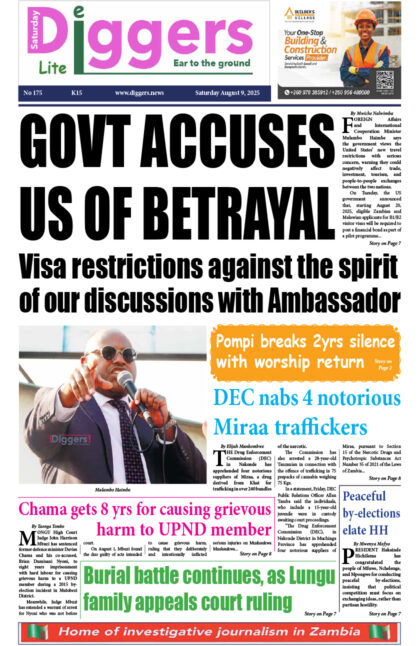THE Ministry of Transport and Communications says it has invested over US $1.6 million in meteorology infrastructure with 140 more automatic weather stations still in the bidding process.
And the Ministry has called for concerted efforts in the formulation of the Meteorology Bill saying its enactment will solve most of the challenges the Department is facing.
Addressing journalists during a tour of the weather station at the Zambia Meteorological Department, which has both manual and automatic facilities, Transport and Communications Minister Mutotwe Kafwaya and his permanent secretary Permanent Secretary Misheck Lungu announced that the Ministry had invested over US $1.6 million in meteorology infrastructure, with 140 more automatic weather stations still in the bidding process
Kafwaya also toured the University of Zambia (UNZA) weather station before proceeding to the Kenneth Kaunda International Airport (KKIA) on Sunday.
“I think right now we are evaluating a tender to procure 120 more automatic stations to be spread across the country. Now, that’s very significant. I have been informed that another 20, the tender is closing. Do we have a situation where government is investing in these very important parts of infrastructure to be able to cause accurate data sharing for proper decision management in terms of whatever sector you might be operating in? I think there are a lot of things involved, technology, the age of equipment, interpretation and so on, so observing that now we are moving from a manual set of data, which was insufficient by the way. I am told 39 manual weather stations were available across the country before PF came into power; now we are sitting at 41, so we have added two. But 85 automatic stations, we only had eight. And the reason we could have had eight is because other areas within the country were not supported by the level of technology, which could support that infrastructure. So, I think that was a factor. But now migrating from that manual system to automatic weather stations, I can only see an improvement in terms of accuracy of data projected to the public,” Kafwaya said.
“Coming round today to see this Met equipment, I see how the investments are interlinked. I am being told that most of this investment is now automatic, that means they are transmitting data on their own and to do that you need Internet, which is being supported by the telecommunication towers that are all over the country. And to store this data, you need infrastructure, which I saw in the data centre. So, I see a lot of relationships in the investments that are happening and that’s very important for me. If you are here at the airport and somebody asks you weather, obviously, you are thinking about flying about pilots, about passengers, but there could be my grandmother, my sister in the villages who are thinking about agriculture; there could be some people who are thinking about climate change. So, we have to get to a place where we integrate these interests and be able to generate accurate data to speak to these various needs and what I see now is that this is the direction we are taking.”
And Lungu said government was investing more to ensure that the current investments in meteorology infrastructure were sustained.
“So, we have invested close to US $1.6 million in all this infrastructure you have witnessed today and we are investing more. As government, it’s our responsibility to provide this information on gratis to the community, but this information comes at a cost. I will give an example of construction organisations, when you are doing designs for whatever design, those are firms that are able to pay for this information and again as you can hear that we were providing raw data, we need our staff to process that information, to give it to these organisations for it to make sense and that is an effort, which to us, you and me, as Zambians, will generate income on behalf of the country. So, that’s why we strongly feel that the support that we want to receive from the Meteorology Bill should be able to sustain the investment that government has put. From 2011 to-date, we have seen a lot of improvements in terms of met equipment,” said Lungu.
In response, Kafwaya said the enactment of the Bill would help solve some of the financing challenges the Department was facing.
“You need to rely on government for ideas and to provide leadership and part of that is to repeal the Act and replace it with one, which has more responsive attributes, the issue of structure is linked to the Act that establishes the Department. If we put in place a good Act, we are going to make sure that our structure is properly expanded, but also the Act will also speak to the commerce aspect of the business that we do, which means that we may solve some of the funding problems from the business that we will generate from the work that we do. So, I see that this Bill will certainly give us solutions. So, let’s push. The legislative committee has taken us back twice or three times to make consultations and make sure we come up with a good Bill, and eventually, a good Act. So, we need to work together to support the process and make sure that the Act that comes out responds to most of the issues that we are sitting with now,” said Kafwaya.
























